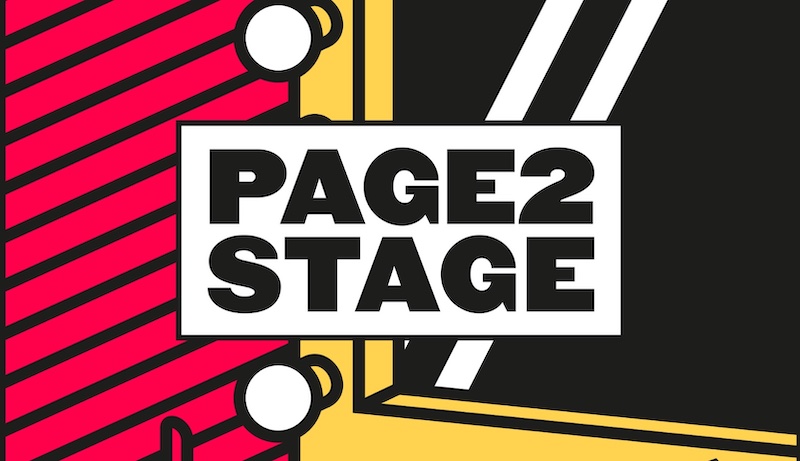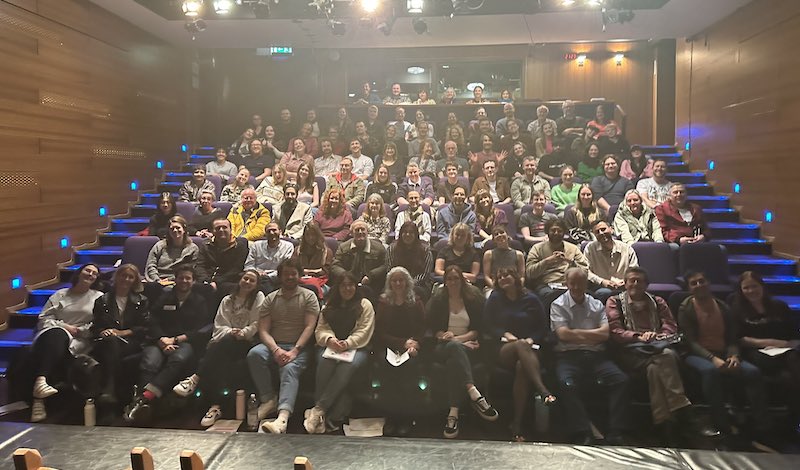Page2Stage hits pause
No CS funding? No P2S playing, says long running scratch night.
Edinburgh scratch-night Page2Stage is putting its script development evenings on hold “for the foreseeable future” after a second application for funding from Creative Scotland was turned down.
The news is obviously a huge blow to local playwrights and to the Page2Stage team led by Michelle McKay. It is also an indication of the huge cracks now appearing in the framework of Scottish arts funding.
In particular, the news reveals that 70% of all applicants to Creative Scotland’s flagship Open Fund are unsuccessful. And that of all projects which the CS specialists recommend for funding, only 40% – two fifths – actually get any money.
The Open Fund, remember, is Creative Scotland’s main route for getting money to Scotland’s small and grassroots companies and projects.
Failures of the Open Fund to provide support have made many recent headlines. It’s easy to shout from the rooftops at the loss of a big book festival, particularly if the ex-First Minister is on your side. But a small new script scratch night? Not quite so much.
Yet nights like P2S are vital to the whole of Scotland’s precarious theatre community and, as we must argue is the case to politicians, to Scotland’s creative industries – if we must use that term.
Where economists talk of the discredited “trickle down” economy, in the arts there is what you might call a trickle up benefit. The idea of a “grassroots” company is no accident: nights like P2S feed into the greater pool of performing, writing and creative talent.
Each night is a learning experience, and one where the participants can take a step further up, nourishing the growth of creative talent in Scotland. It starts in a night like P2S, working up to professional companies, then to the venues and on to the other performing arts, to film and TV studios; the high-profile creative jewels which the government is so keen to attract.
payment
Each P2S scratch night usually has a 15 – 20 minute extract from each of four new plays, with the writer, director and actors all receiving a (small) payment. The plays are performed script-in-hand in front of a paying audience which includes a panel of industry experts.
The format works on all sorts of levels. The headline will be about the number of scripts which go on to have a future life. But other criteria are met, too. Actors get employment, emerging directors get their hands on a live script, and if the playwright’s exact script on the night doesn’t get developed, their practice certainly does.
Creative Scotland is certainly aware of the importance of a vibrant grassroots scene. The wide range of companies which do get funding show that it is doing its best to provide the necessary support. Indeed there are two other scratch nights coming up in Edinburgh which have CS funding.
On Saturday, the Tandem Writers Collective have Rock Paper Scissors at the Traverse, with a script-in-hand performance of Mhairi Quinn’s Rage Room (details). On Friday next week, Framework Theatre Company has a night of new writing from emerging theatre-makers of marginalised genders inspired by the theme Louder also at the Traverse (details).
These two nights are both excellent, but S2P has the benefit of being open to all, which might be its downfall, because the cold fact is that CS doesn’t have enough money to achieve its aims. And when it comes down to the final decisions, ticking additional boxes helps.
The most telling element of the Scotsman’s recent news story about the P2S’s snub is the phrasing of the revelation of the huge gap between demand and availability of funding, contained in a quote from Creative Scotland about the Open Fund.
“For context,” a spokeswoman is quoted as saying in the Scotsman, “we are currently only able to support 30 per cent of Open Fund applications, despite 75 per cent being recommended for funding. Difficult decisions are being made on a daily basis.”
Which, as already stated, implies that only four in every ten eligible projects get funding. Six get turned away, and not because they don’t deserve financial support.
Which makes Creative Scotland’s current rule for applying to the Open Fund of “two attempts and you are out” particularly vicious.
invidious
Such a rule might be reasonable at a time when most eligible applications were getting funding. But when the percentage which can be funded is so low, it seems particularly invidious to bar those who have already applied twice just because there were too many applicants last time.
When P2S got its first KB back in January, a local philanthropist stepped in to allow the two nights in March and April to go ahead. In March there were new pieces by Simon Barker, Kikelo Hassan, Janette Foggo and Charlotte Smith.
The pick of the bunch was Foggo’s contribution, based on her family history, drawing a remarkable performance in broad Scots from Sheila Duncan as an elderly woman expressing her rage at the loss of her two sons in the First World War. There were strong hints that this was just one extract from what could be an epic piece – surely something which Creative Scotland would want to support.
headline failures
There will no doubt be more headline failures in funding in the near future. Already the Fringe and Creative Scotland are at loggerheads.
What I think should really concern us, however, is the large number of small projects which are not being funded.
They are the lifeblood of our theatre landscape. The big companies and venues are haemorrhaging people with talent and skills who are either leaving altogether, taking transferable skills elsewhere, or are moving up to more lucrative jobs in the TV and film studios so beloved of the government.
Where else are they to look for an infusion of skills and talent than from the grassroots and its small projects?
There are many, very sound arguments to support funding the performing arts. And every single one of those arguments is stronger when it comes to Scotland’s grassroots. Without those grassroots, the whole industry is in danger of withering and dying.
Thom Dibdin
ENDS























Whilst there should be more money and there should be more for grassroots projects which are, as you say, the lifeblood of our business you do make a really good immediate suggestion.
If CS could reconsider the 2 strikes rule and include a clause which allows for a 3rd submission if the project is only rejected at Panel stage – ie is recommended by the officers but there is just not enough money or other priorities get preference. At least then some of those 45% get two more attempts, not just one.
And at the same time we have to encourage all levels of government to see the longterm value – economically and socially – of the arts.